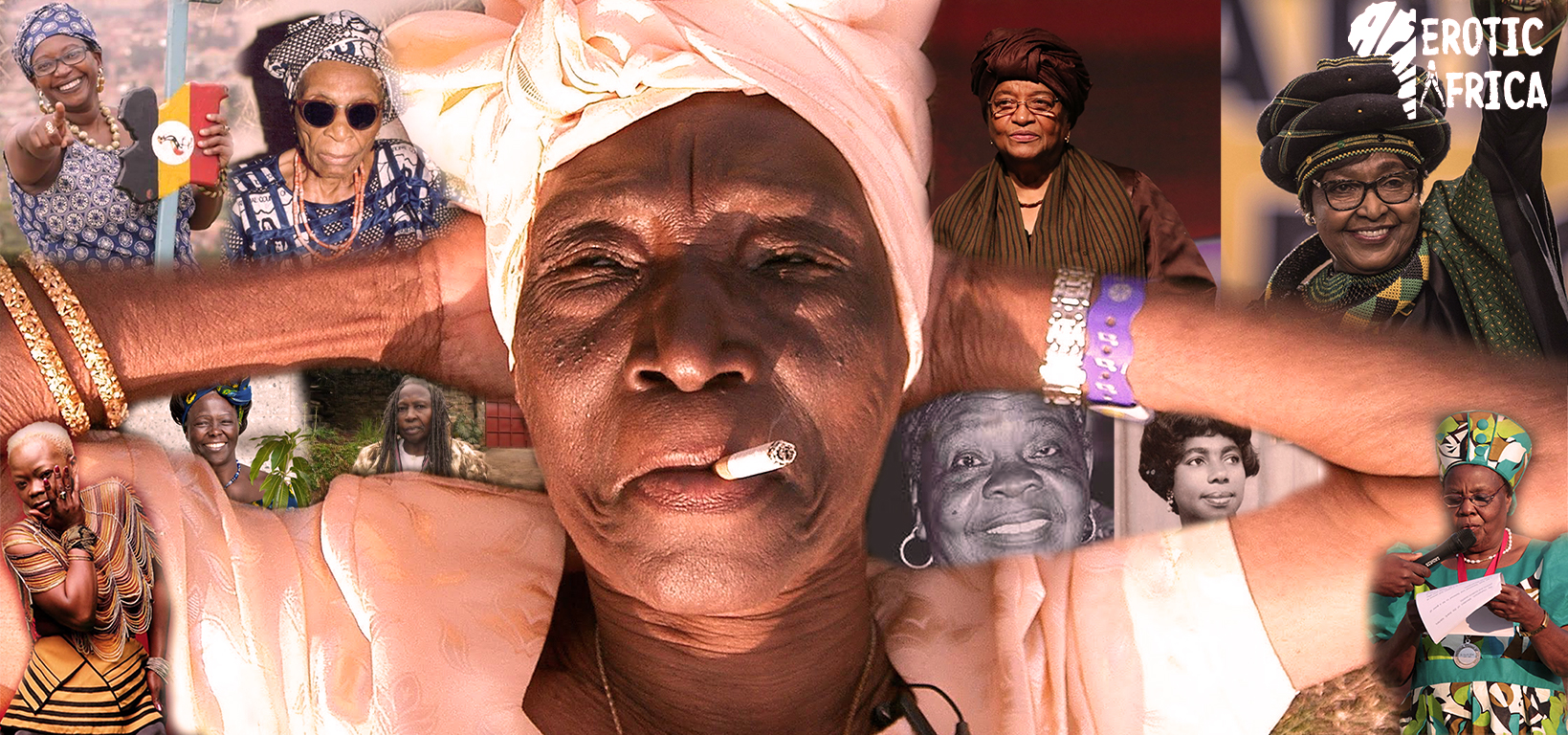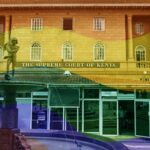Heroines: 11 African women who didn’t give a fuck that you need to bow to
Page Contents
Society is a mean bitch!
Seldom does it live up to its promise to honour, cherish, celebrate, treasure and simply acknowledge her sacrifice but will be quick to heap praises on some species who have suffered no more than she.
Nowhere is this truer than in Africa – the fucking cradle of mankind – where very little acknowledgment and treatment has been accorded to women who gallantly fought for their nation’s independence.
In the six decades since many African countries attained political independence, the stories of women in the liberation struggle is yet to be told authoritatively and celebrated. The little that is told is dealt with in a very casual manner you will be forgiven to think its village gossip.
African heroines have been given a raw deal

This, notwithstanding the fact that quite a number of women were auspicious in the movement and fought like trojans if not Amazons alongside men with the sole objective of securing independence for their nations.
Soon after their nations smelled victory of self determination, were they completely ignored,muzzled and told to shush by pre – independent Africa for what? Because they had a pussy?
Also Read: 10 amazing African BBWs you should know
In stark contrast, their male counterparts wasted no time in building universities, airports and major highways in their honor, going as far as affixing their faces on national currencies, how vain of them.
Fuck society! Long live African heroines
So you know what? Fuck society! today i’m gonna shout at the top of my lungs and celebrate African heroines whom without their sacrifice Mama Africa will not be where she is today.
Yeah today on Kenya’s Mashujaa day, i’m going to raise a toast to all African heroines for all their sacrifices, genius minds, killer beauty, irresistible charm, and fearless attitude.
I know change is not easy, change is not pretty and yes! change is hell painful. More so just like any human they were not perfect but fuck they won’t be forgotten dead or alive not under my watch.
Dr. Stella Nyanzi
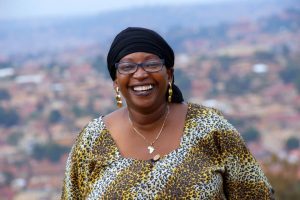
Call her a parrot, go as far as labeling her a harlot it doesn’t matter, Dr. Nyanzi is a fearless Ugandan academic who has balls to stand up to authority when it counts.
She doesn’t give a fuck who she offends in her quest to free up her country-people and make the pearl of Africa the beacon of hope in Africa. Using her wits and sharp tongue she smartly employs “radical rudeness” – an activist tactic with roots in Uganda’s anti-colonial resistance movement, which uses public insult and naked protest to disrupt social norms and criticise those in power.
The feminist writer who is now gunning to be Uganda’s first woman’s president spent almost 16 months inside Luzira prison in Uganda for writing a poem on Facebook about Ugandan President Yoweri Museveni’s mother’s vagina. In the untitled poem, she graphically described the vagina in grotesque terms (one line reads: Yoweri, they say it was your birthday yesterday. How horrifically cancerous a day! I wish the infectious dirty-brown discharge flooding Esiteri’s loose pussy had drowned you to death.Drowned you as vilely as you have sank and murdered the dreams and aspirations of millions of youths who languish in the deep sea of massive unemployment, and under-emplyment in Uganda.”) framing the president’s emergence from the birth canal as a metaphor for his increasingly oppressive near 35-year rule.
While in prison, Nyanzi released a poetry collection, No Roses from My Mouth, made up of 158 poems she wrote behind bars. With sections dedicated to prison, feminism and Uganda.
Upon her release in March this year, Nyanzi came out all guns blazing; Yes told you she isn’t a pussy like some men. When she stepped out of the court in Kampala, she donned a tiara and a sash that read “FUCK OPPRESSION” and began to address crowds.
“It’s good to be out, but it’s not necessarily freedom,” she said, gazing out over the shores of Lake Victoria. “When I got a phone, everyone was saying, ‘Do not [use] Facebook, do not tweet, don’t write anything stupid.’ I’m like, ‘Fuck you, guys!’” she told the Guardian.
An anthropologist by profession, Nyanzi is known for her studies of, and allyship with, marginalized groups, such as the sex worker and LGBT+ communities.
Winnie Madikizela-Mandela (1936 – 2018)
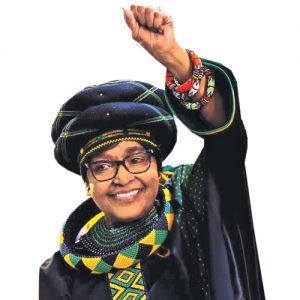
They slandered her but she didn’t give a fuck, that is Winnie Madikizela-Mandela for you.
Strikingly attractive and with a steely air – her given name, Nomzamo, means ‘one who strives’
Even in the face of nasty press coverage and public ridicule and male double standards she remained steadfast to her last breath.
Her uncompromising methods in the long struggle against white rule in South Africa and refusal to forgive contrasted sharply with the reconciliation espoused by her then husband Nelson Mandela as he worked to forge a stable, pluralistic democracy from the racial division and oppression of apartheid.
During her husband’s 27-year incarceration, Madikizela-Mandela campaigned tirelessly for his release and for the rights of black South Africans, suffering years of detention, banishment and arrest by the white-minority regime that ran Africa’s most advanced economy from 1948 to 1994.
She remained steadfast and unbowed throughout, emerging to punch the air triumphantly in the clenched-fist salute of black power when Mandela was released from Cape Town’s Victor Verster prison on Feb. 11, 1990.
Her legacy continues to steer debates to date but like Frank Sinatra sang, “My friends, I’ll say it clear I’ll state my case of which I’m certain I’ve lived a life that’s full I traveled each and every highway But more, much more than this I did it my way.”
Viva Winnie Madikizela-Mandela viva!
Funmilayo Ransome-Kuti (1900–1978)
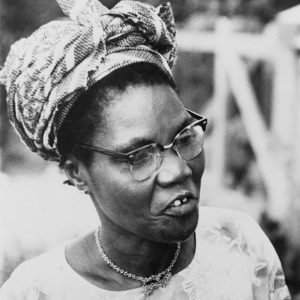
Born in Abeokuta, in present-day Ogun State, Nigeria, Funmilayo Ransome-Kuti was one of the first women to attend Abeokuta Grammar School in 1914, where she would go on to teach making her one of few women in early 1920s Nigeria to receive post-primary education,
Ransome-Kuti didn’t sit pretty and powder her face because she was a ‘high class woman’ Noo she used her privilege to coordinate the resistance against colonialism in Nigeria that not only targeted the British but also the local traditional figureheads they used to enforce their rules.
In 1944, she founded the Abeokuta Ladies’ Club (later, the Abeokuta Women’s Union), committed to defending women’s political, social and economic rights, which became one of the most important women’s movements of the twentieth century.
When the British colonial officers refused to give permits for demonstrations, Ransome-Kuti gave them the middle finger and mobilized local market women for what she called “picnics” and festivals.
Her unwavering commitment to cooperation, solidarity and unity led her to play an active role in politics, notably in the pre-independence constitutional negotiations of 1946.
Ellen Johnson Sirleaf (1938 – To date)
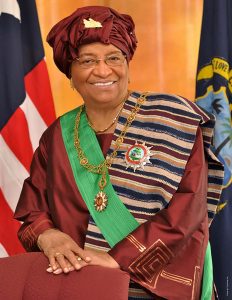
When you see Ellen Johnson Sirleaf stand up and salute! By the time she was in her early 20s she had given birth to four sons, leaving them with extended family while she travelled to the US to obtain her degree. She went on to serve as Liberia’s finance minister, surviving two periods in jail for the positions she took in the increasingly perilous political environment of the 1980s.
In 2006, Sirleaf became Africa’s first elected female president and left office in late January, after overseeing the first democratic transfer of power in Liberia since 1944. During her two terms in office, Sirleaf tackled the spread of Ebola in the West African nation, developed the economy and championed the cause of women.
In 2011, Ellen Johnson Sirleaf, was awarded the Nobel Peace Prize jointly with Leymah Gbowee and Tawakkol Karman “for their non-violent struggle for the safety of women and for women’s rights to full participation in peace-building work.”
Later she was awarded Mo Ibrahim Prize for Achievement in African Leadership joining only four African presidents who have been won namely, Joaquim Chissano of Mozambique (2007), Festus Mogae of Botswana (2008), Pedro Pires of Cape Verde (2011), and Namibia’s Hifikepunye Pohamba (2014).
Wangari Maathai (1940 – 2011)
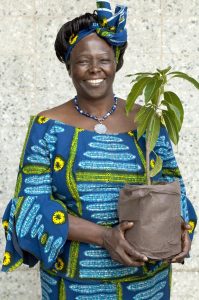
A true heroine whose achievements’ will be remembered long after her sad demise.
No woman in Kenyan history faced a stronger government and paid the ultimate price like she did. From 1970, 80, and 90s she faced head on the then dreaded president Moi’s government and almost brought it to its knees.
In October 1989, Maathai learned of a plan to construct the 60-story Kenya Times Media Trust Complex in Uhuru Park; she opposed the move and wrote several protest letters. The government refused to respond to her inquiries and protests, instead responding through the media that Maathai was “a crazy woman”.
The government was so incensed with her bold protest that it sought to ban the Green Belt Movement, an environmental non-governmental organization focused on the planting of trees, environmental conservation and women’s rights, terming it a bogus organization and its members “a bunch of divorcees”.
On 28 February 1992, Maathai again led tens of wives and mothers of detained political detainees to Freedom corner at Uhuru Park where they proceeded to stage a hunger strike to pressure the government to release the political prisoners.
After four days of hunger strike, on 3 March 1992, the police forcibly removed the protesters. Maathai and three others were knocked unconscious by police and hospitalized.
For her bold actions to inspire change, In 1984, she was awarded the Right Livelihood Award and in 2004, she became the first African woman to receive the Nobel Peace Prize for “her contribution to sustainable development, democracy and peace”.
Muthoni wa Kirima (1931 – To Date)
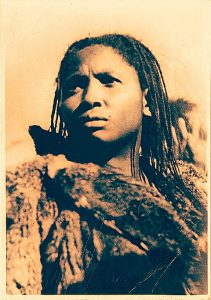
Muthoni sent chills down the spine of British soldiers for a ‘no fucks fearless attitude,’.
She is the only woman to have risen through the Mau Mau ranks and achieved the rank of field marshal. During the struggle of Kenyan independence she led other women in giving the British colonists sleepless nights.
She and a group of 162 women were described as “thugs” and “witches” by the colonial government for their undying support for Mau Mau.
For her boldness she was subjected to physiological, physical and sexual abuse by the colonial government. Lesson here being; you must be ready to sacrifice and suffer in order to bring change.
Mabel Dove-Danquah (1905 – 1984)
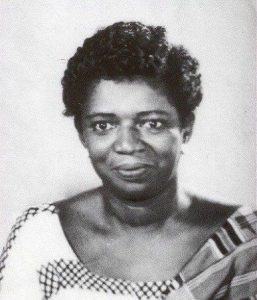
Dove-Danquah is a trail-blazing feminist who was well ahead of her time as an outspoken advocate for women’s equality.
Mabel Ellen Dove Danquah was the daughter of Eva Buckman, a business woman from Osu and Francis Dove a lawyer from Sierra Leone, the first president of the Gold coast bar.
She later went to England and furthered her studies by completing a secretarial course, her father did not approve of. Dove would continue to do what was not expected of a woman. Using her column Women’s Corner by Marjorie Mensah in The Times West Africa (Ghana’s first newspaper 1931–34)”she dared women to break with form, to derive inspiration from the suffragists, to denounce imperialism, and to fight for their rights.
Danquah fiction work stands out because it not only challenged colonial and racial legacies, but also called into question male value systems that denied female subjectivity, and envisioned a “new woman” who could challenge them.
She was among a host of women Nkrumah and his Convention People’s Party used to advance the struggle for independence and would go on to become the first African woman to be elected by popular vote to parliament in 1954.
Vera Chirwa (1932 – To date)
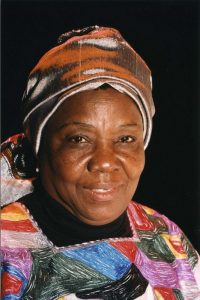
Dr. Vera Chirwa is the first female lawyer from Malawi. Her name ‘Mlangazua’ means truth and she is indeed a fearless woman.
She endured exile and long years of imprisonment when she, along with her husband Orton Chirwa, fell out with president Hastings Kamuzu Banda. She spent 12 years in prison, separated from her husband who died in prison in 1992, until she was freed in 1993.
Following her release, she turned down a lucrative position offer from Geneva, and instead took up the appointment as director of the Legal Resource Centre of the Malawian Law Society.
Vera is a founding member of the Malawi Congress Party, which eventually led the country to win independence. She also founded the League of Malawian Women which did not only fight for the rights of women but was a leading supporter of the resistance against white domination in Malawi.
Vera has been a leading campaigner for human rights and the welfare of the people. She advocated for an end to the death penalty in the country, and was appointed by the African Commission on Human and Peoples’ Rights as a Special Reporter on prison condition in Africa.
Vera Chirwa is the author of “Fearless Fighter: An Autobiography” published by Zed Books in 2007.
Bi Kidude (1910 -2013)
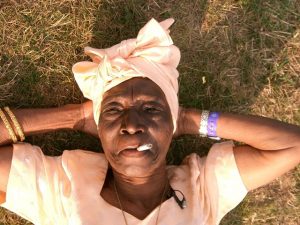
Until she breath her last, Fatma binti Baraka, known as Bi Kidude was a legendary performer of Taarab, a style of Swahili Arab-influenced music, didn’t give a fuck.
Form a young age she was determined to live her life as she pleases and even run away from a Koranic school at the age of 10.
“What was special about Bi Kidude was she lived the life that she wanted to live,” DJ Rita Ray, who worked on her documentary, As Old As My Tongue, told the BBC’s Focus on Africa programme.
“When she started singing Taraab, the female singers sang beneath the veil. She removed the veil – that was really revolutionary and so controversial.
“She followed her own spirit. She ran away from two husbands, she was childless, she drank, she smoked, she really broke their rules but at the same time she embodied all the great cultural aspects of that island.”
Through her classic songs she sang against social injustice and fought against patriarchy, gender based violence and spoke her mind without giving a fuck.
Brenda Fassie (1964 – 2004)
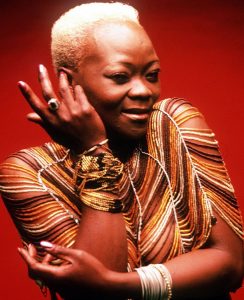
She came she saw and she didn’t give a fuck!
Brenda Fassie was born on November 3, 1964 in Cape Town township of Langa. Born into a desperately poor family and the youngest of nine children, she loved singing from an early age. Her father died when she was two, and her mother, a cleaner, recognized her daughter’s talent early on.
By the age of four, Brenda, named after the US country singer Brenda Lee, was performing at church events, accompanied by her mother on the piano.
At 16, she left Cape Town for Soweto to pursue a singing career. She first joined the group Joy and later became lead singer for the group Brenda and the Big Dudes.
In 1983, she released her debut recording, Weekend Special, a lament about a boyfriend who would see her only at weekends. It was an instant hit and catapulted her to the world arena.
Some of her biggest hits include “No No No Seňor”, “Too Late for Mama” and “Vulindela”.
In 1990, the outspoken singer released the single “Black President”, a tribute to the still imprisoned Nelson Mandela. She then declared that she would stop singing in English, declaring: “I am proud to be an African.” Her subsequent songs were in Zulu, Xhosa and Sotho.
Brenda Fassie didn’t give a fuck what society thought of her and lived freely at a time when millions of black people were cowering in fear of coming out because of stigma.
After her marriage to Big Dudes, a fellow musician crumbled she moved in lesbian lover, Poppie Sihlahla. She was the subject of lurid press scrutiny but she stood steadfast and lived her life according to her own rules.
Even when crack cocaine habit affected her health and career she fought it and went to rehab. Unlike other stars at the time who lived double lives she did not. She inspired by example when she confessed to drug and drink addiction, other prominent musicians went public about theirs. When she took her first lesbian lover, other black celebrities came out of the closet. She is survived by her son, Bongani.
Bibi Titi Mohamed (1926 – 2000)
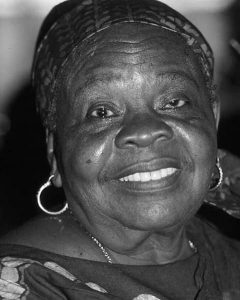
Born in 1926 in central Dar es Salaam to a Muslim family, Bibi Titi Mohamed remains one of Tanzania’s freedom heroines.
Bibi Titi’s father, a livestock trader and devoted Muslim refused to take her to school for fear of alienating her from the Muslim faith. The advent of Christian missionaries in Tanganyika around this time had created a marked wedge between these two faiths spewing mistrust, discord and antagonism.
Upon her father’s demise, however, her mother took her to school. She soon discovered that women were discriminated against, and so decided to venture into politics in order to fight for women’s rights.
In the 1950s, she was the pioneer of those pushing for Tanganyika’s independence from British rule. Within a year of being recruited, as head of the Tanganyika African National Union (TANU) women’s wing, she had attracted 5,000 women to join. Bibi Titi used women’s cultural and economic network to mobilize, exchange information, sell party membership cards, announce rallies, organize marches, and raise money for TANU, which would go on to become the freedom party of modern Tanzania.
After Tanganyika’s independence and in the early years of Tanzania, the union of Tanganyika and Zanzibar, Bibi Titi held different ministerial positions under President Julius Nyerere.
Shortly after independence, Bibi Titi was arrested by the government of her former ally, Julius Nyerere, on trumped-up treason charges. She was sentenced to life in prison but was released after two years on pardon and she spent the rest of her life out of public view.
 2975
2975

